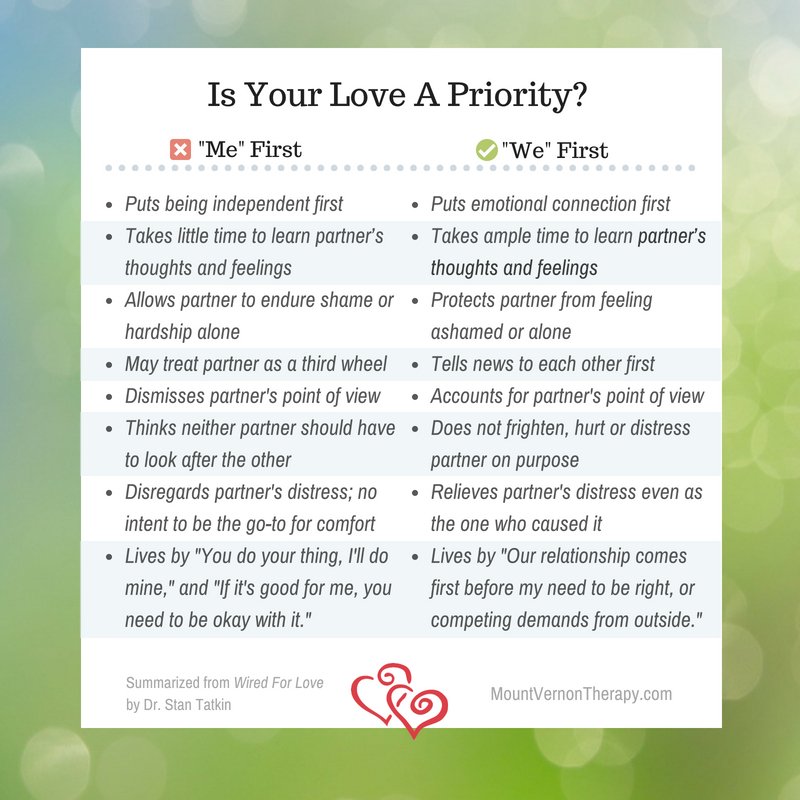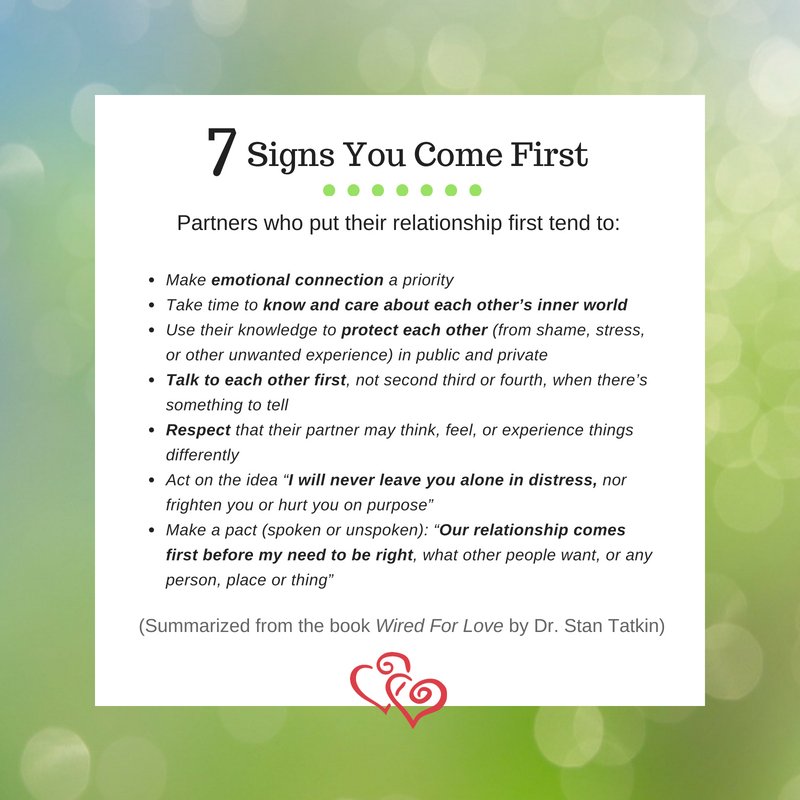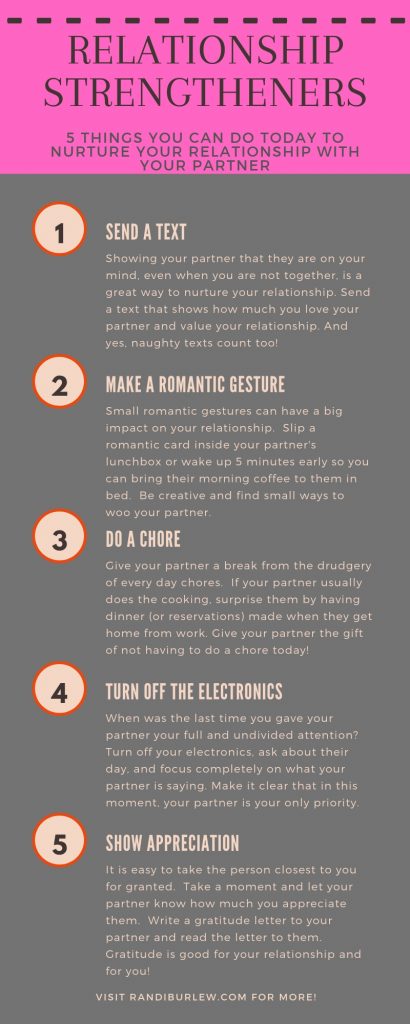
In this article, you will discover effective strategies to encourage your partner to prioritize your relationship. It’s natural to desire a stronger connection and more dedicated attention from your loved one. By implementing these practical tips, you can foster a deeper bond and enhance the importance of your relationship in your partner’s life.

This image is property of mountvernontherapy.com.
Understanding the Issue
Recognizing the importance of relationship prioritization
In any healthy relationship, prioritization is essential. When both partners prioritize their relationship, it ensures that the bond remains strong and resilient. Prioritizing your relationship means making it a top priority in your life, above other commitments and obligations. It involves investing time, energy, and effort into nurturing the connection, creating a strong foundation for a fulfilling and lasting partnership.
Identifying signs of relationship neglect
Neglect in a relationship can be subtle or overt. Some common signs of relationship neglect include lack of communication, decreased quality time together, a shift in emotional intimacy, and a decrease in shared goals and aspirations. If you feel distant or disconnected from your partner or notice a decline in the overall health of your relationship, it may be a sign that your relationship needs more prioritization.
Understanding the potential reasons behind the lack of prioritization
There can be various reasons why your partner may not be prioritizing the relationship as much as you’d like. It could be due to work-related stress, personal issues, or a difference in priorities. Sometimes, your partner may not even be aware of the impact their actions or lack thereof are having on the relationship. Understanding the underlying reasons behind the lack of prioritization is crucial in finding effective solutions and moving forward together.
Open Communication
Promoting honest and open dialogue
One of the key foundations of a healthy and thriving relationship is open communication. Encourage a safe space for both you and your partner to express your thoughts and emotions without judgment. Create an environment where honesty is valued and respected, fostering deeper understanding and connection. By promoting open dialogue, you can work together to tackle any issues that arise and find ways to prioritize your relationship.
Expressing your feelings and concerns
When discussing the lack of prioritization in your relationship, it’s important to openly express your feelings and concerns to your partner. Share how their actions, or lack thereof, make you feel and the impact it has on the relationship. Avoid blaming or criticizing, and instead focus on using “I statements” to express your emotions. This approach can help your partner better understand your perspective and the importance of prioritizing your relationship.
Encouraging your partner to share their perspective
Just as it is important for you to express your feelings and concerns, it is equally important to give your partner a chance to share their perspective. Listen attentively to their thoughts and emotions, and try to understand their point of view. By actively engaging in a conversation where both parties feel heard and understood, you can work towards finding common ground and identifying ways to prioritize your relationship together.
Setting Expectations
Defining what prioritizing the relationship means to you
To effectively communicate your expectations, it is necessary to define what prioritizing the relationship means to you. Reflect on the aspects that hold significance for you and articulate them clearly. Define what actions or behaviors would make you feel prioritized in the relationship. By having a clear understanding of your own expectations, you can better communicate them to your partner.
Communicating your expectations clearly
Communication is key when it comes to setting expectations. Make sure to communicate your expectations clearly and directly to your partner. Avoid assuming that your partner knows what you desire or need in the relationship. Be specific about the areas you would like to see more focus on and the specific actions or behaviors that would make you feel prioritized. This clarity allows both partners to be on the same page.
Discussing shared goals and aspirations
Part of setting expectations involves discussing shared goals and aspirations. Take the time to have conversations about what you both envision for the relationship and how you can work together to achieve these goals. When you align your goals, it becomes easier to prioritize the relationship as you are both working towards a common future. Regularly revisit these discussions to ensure that you are continually growing together.
Quality Time Together
Scheduling regular date nights or dedicated couple time
Quality time together is a vital component of relationship prioritization. Make it a habit to schedule regular date nights or dedicated couple time where you can focus solely on each other. This dedicated time allows you to reconnect, communicate, and create new memories. Whether it’s a romantic dinner at home or a weekend getaway, carving out this time together strengthens the bond and reminds you both of the importance of the relationship.
Engaging in activities you both enjoy
Another way to prioritize your relationship is by engaging in activities that you both enjoy. Find hobbies or shared interests that bring you joy and create opportunities to participate in them together. It can be as simple as going for walks, cooking together, or exploring new places. By engaging in activities that bring you both happiness, you create a sense of togetherness and reinforce the importance of your connection.
Creating opportunities for meaningful conversations
Quality time also involves engaging in meaningful conversations. Set aside time to have heartfelt discussions where you can talk about your dreams, fears, and aspirations. Ask open-ended questions to encourage deep and meaningful dialogue, and actively listen to each other. By creating these opportunities for genuine connection, you foster emotional intimacy and demonstrate the value you place on the relationship.

This image is property of mountvernontherapy.com.
Showing Appreciation
Expressing gratitude for efforts made by your partner
A simple act of appreciation can go a long way in prioritizing your relationship. Take the time to express gratitude for the efforts your partner makes in the relationship. Acknowledge their contributions, whether big or small, and let them know that you value their presence and effort. By showing appreciation, you reinforce positive behaviors and create an environment of love and support.
Focusing on positive aspects of the relationship
Sometimes, in the midst of discussing lack of prioritization, it’s easy to solely focus on the negative aspects. However, it is equally important to consciously focus on the positive aspects of the relationship. Make an effort to highlight and celebrate the strengths, joys, and successes you have experienced together. By shining a light on the positive aspects, you remind yourselves of the reasons why your relationship is worth prioritizing.
Celebrating milestones and achievements together
Take the time to celebrate milestones and achievements as a couple. Whether it’s a work promotion, completing a personal goal, or navigating challenges, commemorate these moments together. Celebrating milestones reinforces a sense of togetherness and reminds you both of the importance of sharing and supporting each other’s journeys. This shared celebration strengthens the bond and encourages further prioritization of the relationship.
Building Emotional Connection
Investing time and effort in deepening emotional intimacy
Emotional intimacy is a cornerstone of a strong relationship. To build and maintain emotional connection, it is necessary to invest time and effort in deepening it. Engage in activities that foster vulnerability and understanding, such as sharing personal stories, fears, and aspirations. By allowing yourselves to be open and vulnerable, you create a safe and secure space for emotional connection to thrive.
Building trust and vulnerability through sharing experiences
Building emotional connection involves building trust and vulnerability. Share experiences together that create opportunities for deeper connection. This could be traveling, trying new activities, or going through challenging times together. By sharing experiences, you create shared memories and strengthen the bond. This shared vulnerability fosters trust and encourages your partner to prioritize the relationship.
Engaging in active listening and empathy
Active listening and empathy are essential skills in building emotional connection. Practice active listening by giving your partner your full attention, maintaining eye contact, and avoiding distractions. Show empathy by trying to understand and validate your partner’s emotions and experiences. By practicing these skills, you create an environment of understanding and emotional support, reinforcing the importance of the relationship.

This image is property of randiburlew.com.
Supporting Individual Growth
Encouraging personal development and self-care
While prioritizing the relationship is important, it is equally crucial to support each other’s individual growth. Encourage your partner’s personal development and self-care. Respect their need for time alone or pursuing personal interests. By supporting each other’s growth, you create a harmonious balance between personal and relationship priorities, demonstrating that prioritization can coexist with individual fulfillment.
Finding a balance between personal and relationship priorities
Finding a balance between personal and relationship priorities is vital in maintaining a healthy partnership. Ensure that you both have time and space to pursue individual goals and interests without neglecting the relationship. Discuss and negotiate how to allocate time and resources to various aspects of life, ensuring that both partners feel valued and supported.
Supporting each other’s passions and aspirations
Supporting each other’s passions and aspirations is an important aspect of relationship prioritization. Encourage and assist your partner in pursuing their dreams and goals. Be their biggest cheerleader and provide a source of unwavering support. By nurturing each other’s passions and aspirations, you foster an environment where both partners feel empowered and valued, reinforcing the importance of the relationship.
Finding Common Interests
Exploring and discovering shared hobbies or activities
Finding common interests is a great way to prioritize your relationship. Explore and discover new hobbies or activities that you both can enjoy together. This could be anything from cooking classes, hiking, painting, or even learning a new language. By engaging in shared activities, you create opportunities for bonding, laughter, and lasting memories.
Participating in each other’s interests
In addition to finding shared hobbies, it is equally important to participate in each other’s interests. Take the time to engage and support your partner in their individual passions. Attend their sports games or artistic performances, learn about their hobbies, and show genuine interest and enthusiasm. By participating in each other’s interests, you demonstrate a genuine commitment to prioritizing your partner’s happiness.
Promoting a sense of togetherness through shared experiences
Shared experiences are powerful in fostering a sense of togetherness. Look for opportunities to create new experiences together, such as traveling, attending concerts, or even taking a cooking class. These shared experiences create lasting memories and deepen the bond between you and your partner. By actively seeking out these opportunities, you reinforce the importance of prioritizing the relationship.

This image is property of abbymedcalf.com.
Seeking Professional Help
Considering couples therapy or counseling
If you and your partner are having difficulty prioritizing your relationship, it may be beneficial to consider couples therapy or counseling. A professional therapist can provide guidance, tools, and strategies to help you work through any challenges and reestablish prioritize. Therapy can provide a safe space for both partners to openly express their concerns and fears, while also facilitating effective communication and problem-solving.
Exploring the guidance of relationship experts
Aside from therapy, there are various relationship experts who provide guidance and resources on prioritizing relationships. Look for reputable experts who specialize in relationships and prioritize their advice. Books, podcasts, and online resources can offer valuable insights and strategies to help you and your partner prioritize your relationship and create a strong and fulfilling partnership.
Seeking advice from trusted mentors or friends
Sometimes, seeking advice from trusted mentors or friends who have successfully navigated similar challenges can be beneficial. Reach out to those you trust and value their opinion. Listening to their experiences and insights can offer fresh perspectives and valuable advice. Hearing stories of successful relationship prioritization can inspire you and your partner to make positive changes in your own relationship.
Reevaluating Relationship Priorities
Reflecting on the importance of the relationship
Periodically, it is important to reflect on the overall importance of the relationship. Take the time to consider the value and significance it holds in your life. Reflect on the positive aspects, the growth you have experienced, and the joy the relationship brings. This reflection allows you to reaffirm the importance of prioritizing the relationship and motivates you to take the necessary steps to maintain a healthy and thriving partnership.
Assessing the commitment level of both partners
Assessing the commitment level of both partners is crucial in understanding the dynamics of your relationship. Reflect on the level of commitment you both have and whether it aligns with each other’s expectations. Assess if both partners are willing to prioritize the relationship and make the necessary changes. This assessment allows for realistic expectations and an understanding of the work required to maintain a strong partnership.
Determining if the relationship is still fulfilling
Lastly, it is important to evaluate if the relationship is still fulfilling for both partners. Reflect on whether the relationship meets your emotional, social, and physical needs. Assess if the relationship brings you happiness, fulfillment, and a sense of purpose. While all relationships have their ups and downs, it is important to determine whether the lack of prioritization is a temporary phase or a deeper issue. This evaluation allows both partners to make informed decisions about the future of the relationship.






